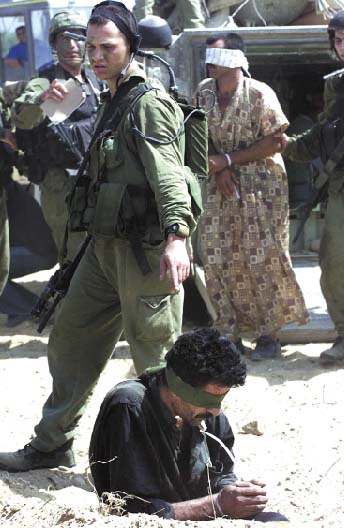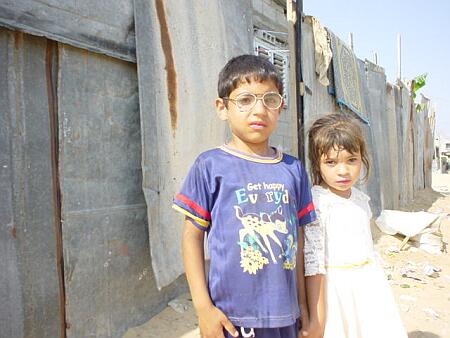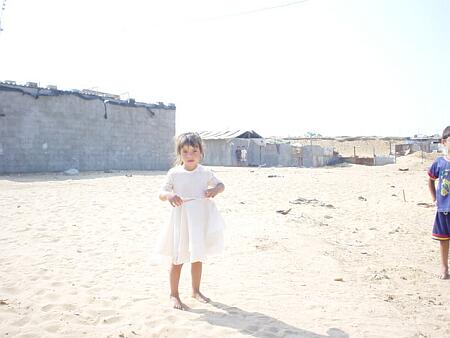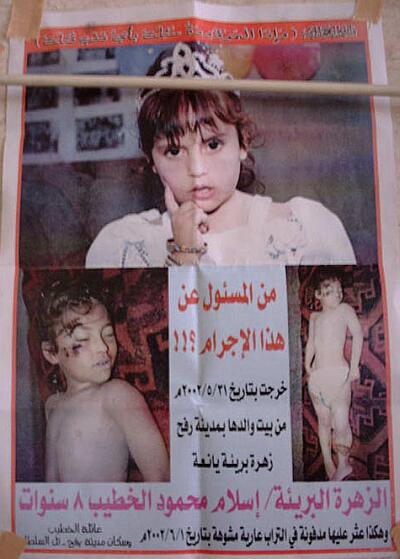
AUGUST 2004
www.rafahtoday.org
This site is kept open by a student wishing to record factual data and photographs of the criminal occupation by the Israeli "Defence" Forces
The family of Naji Abaas

Naji
Abaas is 35 years old, he used to work as a
tailor/dressmaker and never was enganged in any terrorist
or political activities. His family consists of 4
members. They live in Beit Lahia, near Jewish
settlements. The 2 children suffer from anemia and the
family is very poor.
One day, while the family was sleeping at 7 o'clock, a
group of Israli soldiers came with tanks to their street.
They came to their house, smashed the door and entered
the house while all family members were in bed. The faces
of the soldiers were covered with paint, they did not
look like human beings, all family members were shocked
and filled with fear.
The soldiers destroyed all the furniture and all
belongings of the family while they were shouting all the
time. Nothing remained intact. Then they asked Naji to
come to them, and handcuffed him, while anothzer soldier
put his knee on the mother's neck, holding her head down
this way, and saying bad and most insulting things to
her. The woman cried and asked why the sodiers do this to
her family, but instead of and answer, the soldier hit
her head with his weapon.
The other soldiers continued to smash and destroy all the
household items, and they found nothing but bread and tea
in the cupboard, and started to make bad and cynical
jokes about the poverty of the family.
After that, one of the soldiers hit into the face of the
girl child Malak ... the mother asked him, why do you hit
her, she is still a child? The soldier answered: we hit
her because she has brown eyes, and we will take her with
us, because she is our child, not yours, and you have
stolen her from us!! But then he released the child.
Then the soldiers told the mother and 2 children to stand
in the corner of the room and to stay there and not to
move, or they would kill them.

The
soldiers left the completely damaged house with Naji. The
mother and kids spent more than three hours in the house
in that corner. After this, a group of their neighbors
come to this house and ask what happened, then they found
the mother with her two kids crying, and she was unable
to speak with any one.
About 8 o'clock in the evening, they saw their father
coming back, with half of his clothes, with his tears,
and with serious injuries on his body, and he was hardly
able to breath. He reported what happened to him: He said
"they put me in a very narrow hole, and hit me at my
head with iron balls many time, I don’t know any
thing after they cover my eyes, one of the soldiers put
his leg at my head, and put more and more sand on my
head, I felt that they want to bury all my body, it was
horrible, I ask them for help, but I didn’t hear
anything. After that, they left us and went back to their
centers. Then one of the prisoner came and ask me to get
out of this hole, I wasn’t able to do that, because
I was afraid that they are still nearby and would shoot
me when I leave the hole, and because I was so weak I
could not move any more. Finally, a man helped me to get
out of the hole.

The family faces many problems since then. Naji still suffers from his injuries and still has difficulties to breath. They find it hard to cover the expenses for the most basic things of life. The 2 children were now happy to receive a child sponsorship.
Report about about the child Islam Khateeb

The child on
this photo is 8 years old, and her name is Islam Mahmoud
Al Khateeb. Her family found her body buried in the sand
near the Jewish settlement. Her body was burned and they
found evidence of violence on her body.
The parents do not know who committed this crime, but
since the body of her child was found near Tal Al Sultan,
Rafah, where the Israeli soldiers live, they suspect the
child was killed by soldiers or settlers and then buried
in the sand.
update
from other sources
Rafah: We will not give up our
struggle
FALASTEEN
We the people of Palestine are
the bricks, stone and mortar of our country.
We are its Earth, its moon,
and its stars
We are its fruits ,its Oranges, its Olive
Trees, Cacti and Cedar trees and Sweetcorn
We are its mounta
ins,its hills, winding
roads and river and gentle breezes
We are its faith its
culture and its language
We are its heart, its soul and its Memory and
its aspirations and its Dreams
And we, by the grace of
God, will be its Destiny and Future one Day!!
Our struggle lives on as
long as our Strength,Hope and Determination
survives, which will NEVER DIE!
maisoon
http://www.jerusalemites.org/image/rafah-photos/rafah1.htm
Houses Destroyed in Rafah Official Palestinian sources figured out the number of Palestinian owned houses that the IOF had destroyed during this week(last week in July 2004): 35 houses in the Rafah area. http://english.wafa.ps/body.asp?field=tech_news&id=1387 Beit Hanoun officials: IDF destroyed land http://www.haaretz.com/hasen/spages/456912.html By Nir Hason and Yoav Stern Beit Hanoun city hall officials are complaining that every Israel Defense Forces incursion into the Gazan city is causing damage to the infrastructure, and local farmers are bemoaning destroyed farmland. The IDF, which redeployed into Beit Hanoun a month ago to prevent Qassams from being launched into the Negev, said in response that "by the nature of things, the steps taken to achieve the goal of ending the Qassam rocket fire could harm the civilian population to a certain degree." The army says it is making efforts not to harm the fabric of life in the Gaza Strip city, and to that end is in constant contact with Palestinian civilian agencies and with international groups. "So far the IDF has coordinated more than 270 requests to transfer infrastructure equipment, medical supplies or food into Beit Hanoun," said a statement. As for damage to farmland, the army said "a central element in the activity to obstruct the rocket fire is characterized by engineering activity in the farm lands from which the Qassams are fired." According to city hall sources in Beit Hanoun, every time the army rolls in "they break water mains, cut off the electricity, and the phone lines." According to city data, repairing all the damage would cost NIS 8 million. Beit Hanoun has 38,000 residents, mostly earning their livings from farming since no other jobs are now available. About half the city's land jurisdiction is devoted to farming. In the last week, said city hall sources, "the army destroyed some 2,500 dunam of land and more than 200 dunam were exposed just yesterday." "Exposing" is when the army flattens an area so it cannot provide any cover to gunmen waiting in ambush. Also destroyed were water cisterns, hothouses, and a sheep farm. Typical of those harmed directly by the army operations is Araf Ahmed Zaanin. A week ago, soldiers entered his house, put his parents and his six children in one room and took over the rest of the house. "How do you want to have peace when your soldiers come, close us up in one room for hours and hours and don't let us even give our children some milk to drink?" he asks. Zaanin said the army took over his house, which is in a relatively isolated area opposite the industrial zone, and turned off the water, and then destroyed the kitchen, the fence around the house, the windows and the patio - and then expelled the people who lived in the building. "We're going through terrible suffering, terrible," he said, "I call on Israelis - in your democracy you care about animals, too. Please, I call on the associations to come see what is happening here." Last Thursday the army demolished the local fruit and vegetable packing plant, which served some 1,000 farmers in the area. The goods were exported to Europe. Now, the farming collective that owned the packing plant is planning to sue the army for damages. |